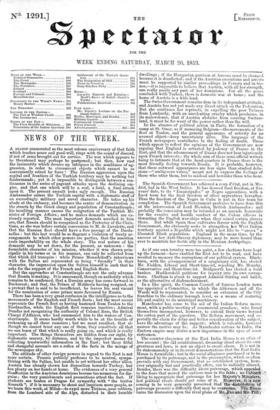NEWS OF THE WEEK.
A SEASON consecrated as the most solemn anniversary of that faith which teaches peace and good-will, rings with the sound of discord, if not of arms brought out for service.. The war which appears to be threatened may perhaps be postponed ; but then, how vast the insincerity which dresses up intrigues in the semblance of ag- gression, in order to. circumvent objects which cannot be so conveniently seized by force ! - The Russian aggression upon the capital and frontiers of the Turkish territory may be nothing but fanfaronnade ; yet it is impossible to distinguish between a con- tinuance in the series of pageant attacks upon the declining em- pire, and that one which will be a real, a fatal, a final attack upon it. The present assault looks ugly enough. The Russian Ambassador enters the Turkish capital with a diplomatic staff of an exceedingly military and naval character. lie takes up his -abode at the embassy, and becomes the centre of demonstration in the streets by the Greek clergy and population of Constantinople; his insulting manner causes the resignation of the Turkish Mi- nister of Foreign Affairs ; and he makes demands which are va- riously reported. The most important demands ascribed to him are, that Russia should be recognized as the Protector of the Chris- tians, as she was before certain concessions to M. de Lavalette, and that the Russian fleet should have a free passage of the Darda- nelles: but this last would be so flagrant a violation of treaty ar- rangements to which other powers are parties, that the assertion casts improbability on the whole story. The real nature of his demands may be set down, for the present, as unknown : the formidable character of his mission, whether it was shown prin- cipally in his terms or in his manner, can only be collected from that which did transpire : while Prince Menschikoff's interviews with the Sultan are represented as being " friendly" in their character, the impression upon the Sultan himself is such that asks for the support of the French and English fleets.
But the approaches at Constantinople are not the only advance that Russia is making. It is announced, though on authority which remains to be confirmed, that a Russian army has come forward to Bucharest' and that, the Prince of Moldavia having resigned, on a pretext that is said to be insufficient, he leaves his seat vacant for the nomination of some prince more favoured by Russia. There has been,a very great confusion in the intelligence as to the movements of the English and French fleets ; but the most recent represents the French fleet as having hastened from Toulon to the Dardanelles, while the English fleet remains inactive ; Admiral Dundas not recognizing the authority of Colonel Rose, the British Chargé d'Affaires, who had summoned him to the waters of Con- stantinople. It seems hardly worth while to be at the trouble of reckoning up all these rumours ; but we must recollect, that al- though we cannot trust any one of them, they constitute all that we can learn of that which is really going on, and which is really important. The things themselves are hidden from our sight, by diplomatic secrecy, by distance, and by the imperfect means for collecting trustworthy information in the East; but these fitful and changeful accounts are a reflex of the facts in the mirage of the newspaper sky. The attitude of other foreign powers in regard to the East is not more certain. Prussia publicly professes to be neutral, sympa- thizing with the Sultan, but unable to act without her other allies. Austria has already shown her disposition towards Turkey, but has plenty on her hands at home. The evidences of a very general disaffection in the Austrian dominions become too numerous for dis- guise ; the very punishments and precautions attest the fact. If students are beaten at Prague for sympathy with " the traitor irossuth "; if it is necessary to'shoot and imprison more people, as we learn this week, at Milan—to expel more Ticinese, poor cottiers, from the Lombard aide of the Alps, disturbed in their humble dwellings ; if the Hungarian garrison at Ancona must be changed because it is disaffected; and if the Austrian executions and arrests must be supported by similar proceedings in Ferrara and in Ge- noa,—it is impossible to believe that Austria, with all her strength, can really pacify any part of her dominions. For all the peace concluded with Turkey, there is domestic war at home ; and the home of Austria is a wide land.
The Swiss Government remains firm in its independent attitude ; and Austria has not yet made any direct attack on the Federation. But she continues her reprisals, in expelling the poor Ticiuese from Lombardy, with an unrelenting cruelty which proclaims, in its malevolence, that if Austria abstains from coercing Switzer- land, it must be for want of the power rather than the will. In the absence of political action in Paris the formation of a camp at St. Omer, as if menacing Belgium—the movements of the fleet at Toulon, and the general appearance of activity for no avowed object—keep uncertainty alive. The language of the French newspapers contributes to the feeling of doubt. Those which appear to reflect the opinions of the Government are now arguing that England is actuated by jealousy of France in the East, and that the advancement of Russia does not bear injuriously upon French interests ; the whole aim of these semi-official writers being to intimate that at the head-quarters in France there is the most friendly feeling towards Russia. It is probable, however, that these outward appearances are less signs than studied delu- sions—" ambiguous voices," meant not to express the feelings of those who utter them, but to mislead and bewilder those who hear.


























